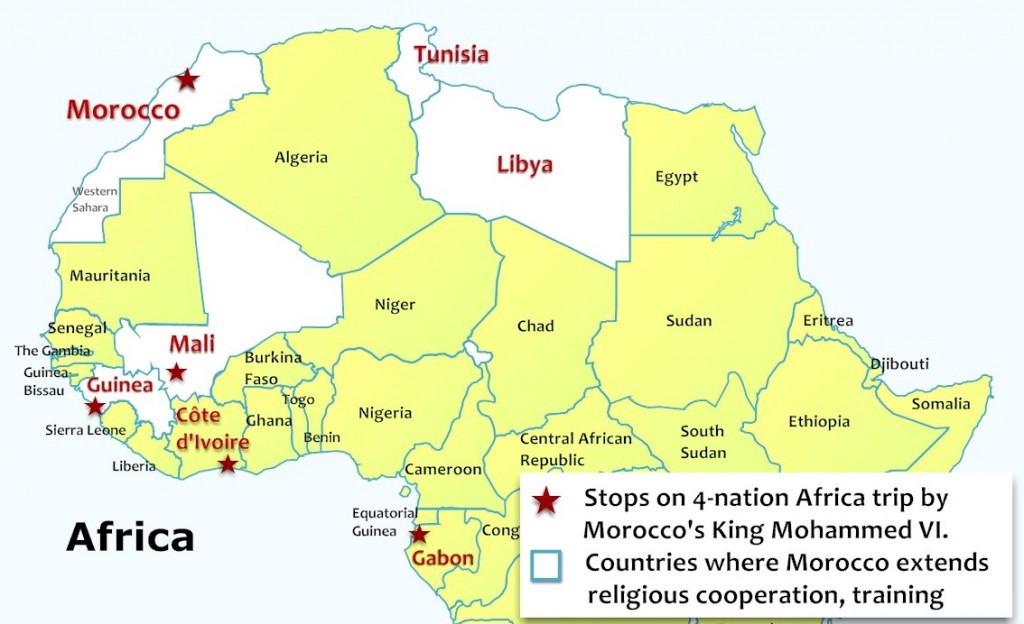Updated
Weaving Together The Neighborhood: How Progress Grows Through Regional Integration – Jean R. AbiNader
.
*King of Morocco building strong transactional network among West Africa partners*
.

Jean R. AbiNader, Exec. Dir., Moroccan American Trade and Investment Center
Jean R. AbiNader, MATIC
March 15, 2014
There may be political issues on which political leaders disagree, but one common goal unites them – generating jobs, especially ones that change citizens from low wage earners to middle class workers. This is the revolution that is being projected for Africa, and one of its interlocutors may well be King Mohammed VI of Morocco.
On his recent visits to Mali, Guinea, Cote d’Ivoire, and Gabon, the King presided over the signing of more than 80 agreements. As details emerge, their specificity and substance deviates from the usual niceties of “will work towards” and “intend to” that characterize more diplomatic and non-impactful documents.
While the crucial next steps of financing and project management included in the agreements cannot be overlooked, it is also worthwhile to understand the strategic direction in which they will take Morocco and its partners in the coming decade. Setting aside the security and religious/cultural accords, there are discernible patterns in the agreements that make it clear why international donors should consider Morocco’s expertise in the region when funding triangular aid projects.
In Mali, the first order of business was a series of agreements to strengthen the financial sector through advanced skills training, human resources, and enabling a more modern infrastructure. Mutual interests in commercial transactions, tax regulations, and investments were also addressed, as well as industrial cooperation in mining, and cooperative programs in health care. In all, 17 agreements were signed.
The same concentration on economic, social, and human development was evident in the 26 public-private partnerships signed in Cote d’Ivoire, which included government and private sector-funded initiatives. Of potentially great benefit to both countries are protocols affecting the fishing industry, including the joint construction of an unloading point in the town of Locodjoro, uniform clearance procedures between three Moroccan ports (Dakhla, Agadir, and Casablanca) and Abidjan, construction of a fish processing plant, and a joint committee to implement the agreement on sea fisheries and aquaculture. In terms of jobs and human development, there are agreements to build social housing units, tourism projects, a pharmaceutical manufacturing facility, more scholarships for higher education in Morocco, greater scientific and research collaboration, and a series of government and bank-related accords focused on project funding, credit access for business, and tourism, export, and trade promotion.
In Guinea, 21 bilateral agreements were signed, and the pattern of building on Morocco’s strengths to best serve regional economic integration continued. Several technical agreements were signed to facilitate trade and investment by eliminating double taxation and tax evasion. Once again, the fishing industry received special attention. Formal mechanisms were set up between the relevant ministries for cooperation and capacity building for staff in Guinea’s Department of Fisheries and Aquaculture. The two allies also agreed on the construction of two developed landing points, cooperation of sea fisheries, the merchant navy, and maritime transport. The construction of 6,000 units of low-income housing was announced, as well as accords on technical training, support for small business development, and banking cooperation. Two special projects were highlighted: a state-of-the-art Moroccan military field hospital to provide surgical and advanced medical care for Guineans and a joint venture to build a flour mill near the capital to address local needs.
On the last leg of the king’s trip, in Gabon, there was no let-down in the level of activity. The 24 agreements that were signed covered agriculture, health, housing, vocational training, finance and banking, transportation and tourism, and stronger legal cooperation. Some of the more prominent accords include cooperation on food safety standards, the merchant marine and maritime transport; long-term collaboration on tourism development; scientific and technical cooperation on mining; real estate development; social housing; a license to Maroc Telecom to operate a 3G/4G network; expanded scholarships for university students; and a tax and customs agreement.
 A noteworthy project on the humanitarian front was the visit of the King and President Ali Bongo Ondimba to the Libreville Cancer Treatment Institute, a joint project with the Lalla Salma Foundation for Cancer Prevention and Treatment, headed by the King’s wife. The two leaders also presided over a new strategic partnership, as Morocco and Gabon signed a $2.3 billion joint-venture fertilizer project that will promises to significantly increase agricultural output and improve food security in the region.
A noteworthy project on the humanitarian front was the visit of the King and President Ali Bongo Ondimba to the Libreville Cancer Treatment Institute, a joint project with the Lalla Salma Foundation for Cancer Prevention and Treatment, headed by the King’s wife. The two leaders also presided over a new strategic partnership, as Morocco and Gabon signed a $2.3 billion joint-venture fertilizer project that will promises to significantly increase agricultural output and improve food security in the region.
The bottom line is that these programs are driven by the need for results: to elevate the capacities of countries in the region to cooperate at a higher level on financial issues, transport and maritime concerns, human and social development, industrial and agro-industrial projects, trade and investment, and a range of educational and tourism efforts, among others. The King certainly recognizes that he has a key role to play , and that his leadership will be judged by his ability to set a clear direction for Morocco’s growth and development. Through his continuing efforts to extend this vision through regional partnerships that support and benefit the African people, he is firmly committed to the future of Africa.
Jean R. AbiNader is Executive Director of the Moroccan American Trade and Investment Center.
Co-published with Fair Observer (http://www.fairobserver.com/).